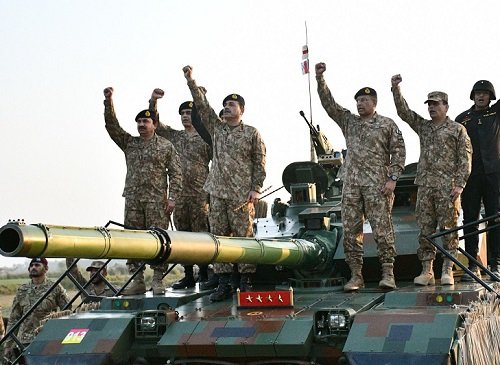If India Violates Ceasefire, Retaliation Will Be Ruthless – Stern Warning from Pakistani Military Spokesperson General Sharif in Sky News Interview
In a strong warning during an interview with Sky News, Pakistan Army spokesperson Lieutenant General Ahmed Sharif Chaudhry declared that any future ceasefire violations by India would trigger a “swift and decisive response” from Pakistan.
If India Violates Ceasefire, Retaliation Will Be Ruthless – Stern Warning from Pakistani Military Spokesperson General Sharif in Sky News Interview
If India Violates Ceasefire, Retaliation Will Be Ruthless – Stern Warning from Pakistani Military Spokesperson General Sharif in Sky News Interview
In a strong warning during an interview with Sky News, Pakistan Army spokesperson Lieutenant General Ahmed Sharif Chaudhry declared that any future ceasefire violations by India would trigger a “swift and decisive response” from Pakistan.
General Chaudhry, who heads the Inter-Services Public Relations (ISPR), the media wing of the Pakistan military, stated, “If anyone tries to infringe upon our territory, integrity, or sovereignty — our response will be ruthless.”
This interview comes just four days after a new ceasefire agreement was signed between the two nuclear-armed neighbors, making the warning particularly significant.
General Chaudhry added that if India attempts to create a scenario for “limited war,” it would, in effect, be preparing the grounds for “mutual destruction.”
He cautioned, “Anyone with logic and reason — such as the United States — will realize how irrational and dangerous India’s approach is.”
Although the border is currently calm, tensions remain high following a recent deadly clash along the Line of Control (LoC). Indian Prime Minister Narendra Modi recently declared that India would no longer “bow to nuclear blackmail.” He emphasized that India’s new approach to cross-border terrorism represents a “new normal,” where no distinction will be made between terrorists and state-sponsored actors.
In contrast, Pakistani military leadership argues that India’s narrative around terrorism is actually a smokescreen aimed at diverting attention from the Kashmir issue.
General Chaudhry, a close aide to Pakistan’s Army Chief General Asim Munir, said India is attempting to transform the Kashmir issue “from an interstate dispute into an internal matter,” using militarization to suppress the will of the Kashmiri people.
He asserted, “The resolution of this issue must be based on the wishes of the Kashmiri people, as per United Nations Security Council resolutions.”
Meanwhile, U.S. President Donald Trump has expressed a willingness to mediate the Kashmir conflict. However, India has historically rejected third-party intervention, and this time was no exception. According to India, the issue must be resolved bilaterally.
Diplomatic analysts note a clear divergence in the positions of the two countries. While Pakistan is presenting its defensive posture as a strategic success, Indian officials appear angered by the renewed interest from the U.S. in the Kashmir dispute.
Despite the renewed tensions over Kashmir, a superficial calm remains at the border. However, the political and ideological disputes persist — with Kashmir remaining at the very heart of the conflict.










